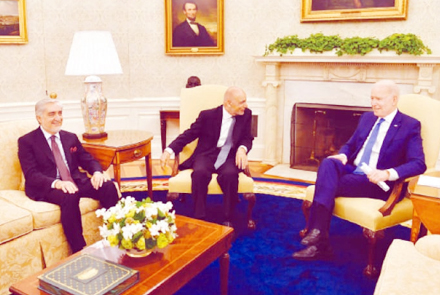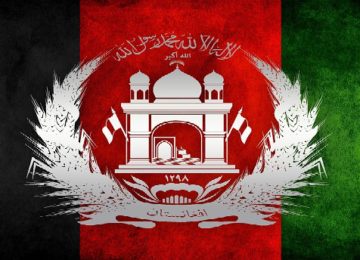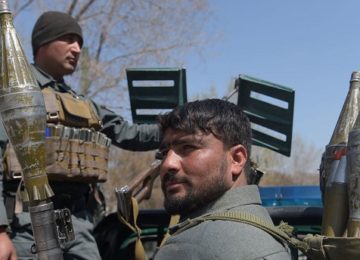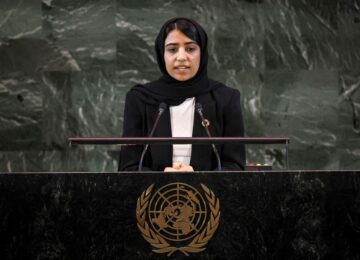July 05, 2021
On June 25, United States President Joe Biden met with Afghan leaders, Ashraf Ghani the President of Afghanistan, and Dr. Abdullah Abdullah the Chairman of the High Council on National Reconciliation (HCNR) at the White House. The meeting comes as the Biden administration accelerates US troop withdrawal plans before the September 11 deadline to terminate a 20-year-old deadly war.
By Inviting both Afghan leaders to the White House, the US unequivocally indicated that the US wants to keep all stakeholders on board and expects from all parties to work together to resolve their differences and find an amicable solution to the Afghan crisis. It is quite evident from the statement of US president which he gave in the same meeting, President Biden said, “We are determined to have unity, coherence”.
Previously, the US has been criticized enormously for its decision of troop withdrawal. Many termed it ‘hasty’ and anticipated severe repercussions in the form of a civil war and chaos in the country. For instance, Mitchell McConnell, a senior senator and a member of the Republican Party accused President Biden and said he has “chosen to abandon the fight and invite even greater terrorist threats” and advised the administration to postpone the withdrawal of U.S. forces.
As a response to the senator’s statement, press Secretary Jen Psaki stated that “the conflict in Afghanistan—which the United States is preparing to hand over to the government in Kabul—is ‘not a winnable war.’” This statement from Jen Psaki illustrates that the Biden administration has therefore been quite explicit about its position, which implies it will comply with its decision.
In the meeting with Afghan leaders, the US president reassured US support to Afghanistan calling it ‘sustainable’. He expressed, “The partnership between Afghanistan and the United States is not ending, “It is going to be sustained, and you know, our troops are going to be leaving, but our support for Afghanistan is not ending.” Moreover, in a tweet just a few hours before the talks Biden said, as “the U.S. military drawdown continues, we affirm our enduring support for the Afghan people.”
Nevertheless, the question here is considering, the Afghan government is either losing control or contesting in most of the Afghan districts how and in what ways the US will support Afghanistan after troops withdrawal? Is it just going to be the economic support and who is going to regulate the support coming from the US? Since US-led NATO foreign soldiers began their final pullout in May, the Taliban have gained power of several dozen districts leaving thousands of civilians displaced.
President Biden in the same meeting gave the strong message that now Afghanistan has to take the responsibility and lead further on their own. He mentioned, “Senseless violence has to stop, Afghans are going to have to decide their future, what they want.”
One of the conclusions that can be drawn from the recent meeting between Biden and Afghan leaders is, the US wants Afghanistan to step up and take responsibility for its future the US, no longer going to regulate Afghan affairs. The US will continue its support in the form of aids and other infrastructural funds but certainly not going to involve itself in the conflict.
Micheal Kugelman Deputy director Asia Program at The Wilson Center tweeted while summing up Biden’s meeting with Afghan leaders as “In the end, Ghani & his delegation got what they sought: the US pledges of continued diplomatic/financial support. But such support can only go so far. The Afghan leadership returns home to a rapidly intensifying conflict that it must confront alone, as US troops head for the exits.”
After 20 years long destructive warfare in which thousands of Afghans lost their lives, families and properties, millions of them displaced and forced to live as refugees, today the US is ready to leave Afghanistan stranded with an uncertain future.
The US now, wants Afghanistan to decide its destiny but given the current scenario and Taliban’s expanding control, the question is, does Afghanistan has enough capability at the moment to decide its future and deal with current crisis? If US departs from Afghanistan without adequate strategy and planning, it can definitely lead to further complications and will jeopardies regional peace.
Aamna Khan, A freelance columnist and a PhD student majoring in International Relations at Jilin University, China
© Center for Research and Security Studies (CRSS) and Afghan Studies Center (ASC), Islamabad.








